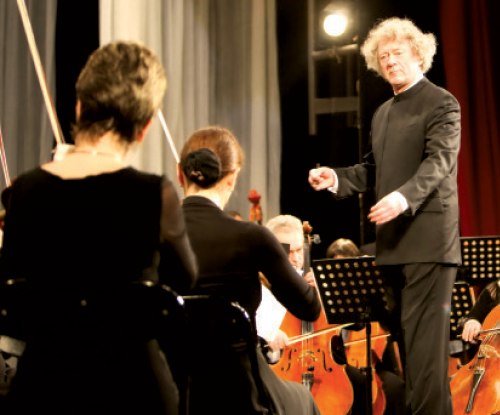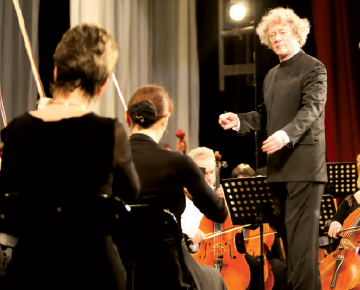
Alexander Anisimov puts part of his soul in his work
New symphonic pieces, chamber music and ballets are regularly performed abroad and enjoy great popularity. Modern composers are common there. But is it possible for Belarus to witness a similar situation?
Advertising, promotion, composing and performing new pieces have always been an expensive business abroad — either in Europe, in America, or Asia (Japan and Korea). These come to life exclusively owing to powerful capital support.
We could hardly compare this to the Belarusian situation. However, we are doing our best to achieve progress, with evident success registered. We’ll perform music by our leading composers in the coming season. Among them are Gorelova, Mdivani, Kortes and Smolsky. Full houses are gathered at present, but we sometimes need to try tricks: Kortes’ ‘Bear’ (staged under Chekhov’s play at our Philharmonics) shared the same programme as a French violist’s concert. Audiences came to listen to the famous French artist, but truly enjoyed the previously unknown music by Sergey Kortes.
What kind of support does our academic music need? You probably have ideas on how to mend the situation.
We need to invent no measures. Buying commissions should listen to more music and try to promote the financing of new pieces. Really, composers must not personally visit official agencies with a request to receive the opportunity to earn money for their music. Others should do this job.
How do you accept a modern trend when academic music is mixed with other genres — such as combination of classical and rock pieces or symphony-rock concerts?
I view this as nothing extraordinary. Moreover, I’m personally involved in similar experiments. I don’t consider rock music to be the devil’s invention. Nothing of the kind! This is true music if performed with great talent, beautifully and worthily. Of course, we need to think over the balance and proportions. During the last major season, we performed much classical music but also had a concert featuring the ‘Okean Elzi’ band. That was great: on one hand, we attracted new fans and, on the other, we love different genres.
We also had a joint concert with the ‘Scorpions’. In addition, during our recent tour of St. Petersburg, we performed a symphonic suite of ‘Led Zeppelin’ music. That happened in good time: a summer park music festival was in the full swing. We performed in the Gatchina Park, with 20,000 in attendance. That was a great concert — taking place at 2am, near the lake. Why shouldn’t we invent something similar in Belarus? Nothing is impossible but we need support. At least, we need someone who will listen to us and agree that this bright idea truly deserves promotion.
Our orchestra is successfully participating in interesting Minsk projects: the Bashmet Festival and the Spivakov Festival. Meanwhile, a classical music brand needs to be created. With this in mind, I’ve received support at the Presidential Administration.
Some assume that classical music is on the decline, while others state that it’s flourishing at the moment.
Much depends on the geography and circumstances. In Belarus, we observe no negative tendencies.
What is the new season preparing?
It’s a difficult season ahead. We’ve received many invitations from abroad and our team will tour — either as a whole band or separate artistes. As a result, we’ll not manage to gather all our musicians each week, as the entire State Academic Symphony Orchestra — as I view it as our musical culture passport. With this in mind, I hope each concert will become a true event.











